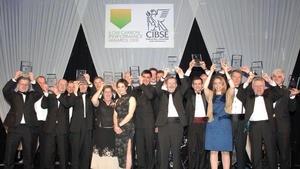The Winners
Best Carbon Saving Campaign
Natural History Museum
The museum introduced activities including a “night-time zero project”, recycling, an open day, local cooling computer programme and a calorie counter spreadsheet to encourage staff to avoid the lifts and take the stairs.
Runners-up: Marston’s plc, United Business Media, HLM Architects, Medway Maritime Hospital, Morgan Professional Services
Best Carbon Saving Programme
Bolton Wanderers Football Club
Initiatives focused on reducing water and electricity usage, a trial of “waterless urinal blocks”, energy saving lamps and recycling.
Runners-up: Spitalfields Estate, Fulcrum Consulting
Best Carbon Saving Multi-site Campaign
Maritime & Coastguard Agency
The agency has 512 sites, with about 1800 employees and 3500 volunteers. Co-ordinators in each region helped to roll out the campaign so all members of staff could help make the initiative a success.
Runners-up: Transport for London, Faber Maunsell, Morgan Professional Services, Scottish Water
Champion of Carbon Saving Champions
Bob Jauncey of Marston’s plc
The judges said Jauncey led from the front, practised what he preached and was not afraid of putting his head above the parapet – three key qualities of a successful carbon champion.
First runner-up: Rachel Kerlir, BDP.
Second runner-up: The TFL Behavioural Change Champions
Best Carbon Performance
Medway Maritime Hospital
The hospital was highly involved in both the 2006 and 2007 100 Days campaigns, helping to cut emissions and raise awareness within the hospital and beyond.
Runners-up: Fulcrum Consulting; Transport for London; Natural History Museum
Low Carbon New Build Project
Faber Maunsell for City Campus East, University of Northumbria
Sustainability was a guiding theme from the inception of this project.
Runners-up: DSSR Consulting Engineers for the Scottish Natural Heritage HQ; KingShaw Associates for the Innovate Green Office; Rhondda Cynon Taf County Borough Council for the Rhydyfelin Children’s Centre.
Low Carbon Refurbishment
Sheffield City Council Energy Unit for Sheffield Schools Project
The project was to deliver carbon savings in schools by providing roof insulation, cavity wall insulation, draught proofing and other energy efficiency measures.
Runners-up: Rhondda Cynon Taf County Borough Council for Hafod Primary School and Llwynpia Primary School.
Low Carbon Innovation
ABS Consulting for the ConCom Project at Imperial College Healthcare NHS Trust
The Continuous Commissioning project, developed by ABS Consulting with the Imperial College Healthcare NHS Trust and the Carbon Trust, enables the energy consumption of building services to be limited to that required to meet the occupier’s business needs and to provide a safe and comfortable environment for the occupants.
Runners-up: Information Prophets Energy Services for Digital Energy; Carbon Low Ltd for the Carbon Low Ongoing Emissions Evaluation Tool; Rybka for Eco Hat.
Low Carbon Client
Oxford Radcliffe Hospitals NHS Trust for the Churchill Hospital
This new specialist cancer care centre is designed to be the UK’s most energy efficient hospital.
Runners-up: SEEDA; Historic
Royal Palaces for the Clore Education Centre
Low Carbon Consultant
Michael Clarke
Low Carbon Pioneer
Bill Bordass
Bordass has worked on energy benchmarks and case studies in the UK and post-occupancy surveys including the Probe series. He is also technical director of the Usable Buildings Trust– a non-profit organisation dedicated to improving building performance by the better use of feedback.
Low carbon projects, professionals and pioneers were rewarded last month at the first annual Low Carbon Performance Awards.
Launched by CIBSE, in association with energy supplier E.ON, the awards aim to reward low carbon performance, not promise.
CIBSE president John Armstrong said: “The awards were a perfect way of ending the 100 days campaign and celebrating the continuing success of the Low Carbon Consultants register.
“All the winners have exhibited commitment and determination in ensuring their carbon saving activities made the greatest impact.”
Source
Building Sustainable Design






















No comments yet